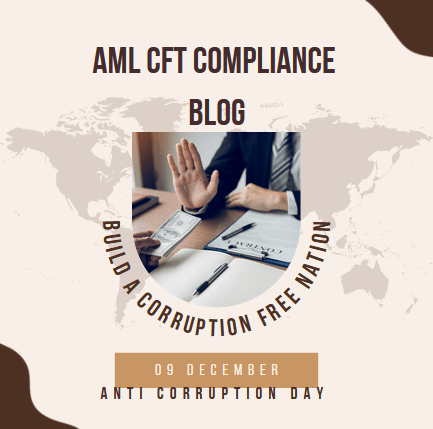AML CFT Compliance
Intro
An International Anti-Corruption Day……ever heard of it? What is the point of this day though? What do we expect to accomplish with an International Anti-Corruption Day? Do you as a Compliance Officer know anything about this international day? How important is corruption for you as a Compliance Officer? Let’s take a further look, shall we?
Corruption
Transparency International defines corruption as the abuse of entrusted power for private gain. Corruption erodes trust, weakens democracy, hampers economic development, and further exacerbates inequality, poverty, social division, and the environmental crisis.
The United Nations UNODC defines corruption as a complex social, political, and economic phenomenon that affects all countries. Corruption undermines democratic institutions, slows economic development, and contributes to governmental instability. Corruption attacks the foundation of democratic institutions by distorting electoral processes, perverting the rule of law, and creating bureaucratic quagmires whose only reason for existing is the soliciting of bribes. Economic development is stunted because foreign direct investment is discouraged and small businesses within the country often find it impossible to overcome the “start-up costs” required because of corruption.
Apart from raising awareness against the crime, the aim of the anti-corruption day is also to actively support campaigns that combat and prevent corruption. Through this day, the UN also seeks to support international cooperation to fight against corruption.
Corruption and AML- CFT
Corruption and money laundering are intrinsically linked. Corruption offences, such as bribery or theft of public funds, are generally committed for the purpose of obtaining private gain. Money laundering is the process of concealing illicit gains that were generated from criminal activity.
The FATF Recommendations were designed to combat money laundering and terrorist financing, but when effectively implemented they can also help combat corruption, by:
- safeguarding the integrity of the public sector
- protecting designated private sector institutions from abuse
- increasing transparency of the financial system
- facilitating the detection, investigation and prosecution of corruption and money laundering, and the recovery of stolen assets.
- availability of beneficial ownership information. Countries need to make sure that up-to-date and accurate information is rapidly available to authorities so we can stop anonymous shell companies laundering funds.
- increase oversight of the non-financial sectors. The gatekeepers to the financial system – such as lawyers, accountants, and company service providers – need to be inside the regulatory tent so law enforcement agencies have relevant information to build cases.
Cost of corruption
Political costs, freedom and rule of law.
Social costs, participation and trust in government.
Environmental costs, chance for a healthy environment and a sustainable future.
Economic costs, opportunity to build and grow wealth.
Use the word ‘my’ after every cost and see how it feels to you. Tell me whether you are going to consider corruption only while dealing with your PEP clients at work, or whether you will start considering how important and relevant this topic is for you, your family, and your community….
Further reading:
https://www.unodc.org/documents/treaties/UNCAC/Publications/Convention/08-50026_E.pdf
http://www.fatf-gafi.org/publications/corruption/?hf=10&b=0&s=desc(fatf_releasedate)
